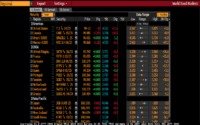White House insists economy is strong as allies grow restless over Fed
Comment on this story
comment
President Biden and his top advisers insist the US economy remains strong, even as it shows new signs of slowdown and the White House’s own allies express unease about the government’s response to rising prices.
As inflation surged last year, Biden and his senior aides repeatedly made it clear that they were confident the Federal Reserve could tame rising prices with higher interest rates and other monetary policy tools.
But with Fed Chair Jerome H. Powell taking an aggressive stance, the White House now faces the prospect that those efforts will prove too much and instead plunge the economy into recession. On Thursday, the Bureau of Economic Analysis reported that growth contracted for the second straight quarter, while business investment and consumer spending fell sharply. Jobless claims have risen in recent weeks, suggesting new cracks are forming in the job market, and the latest inflation report this month showed prices rose 9.1 percent in June from a year earlier.
Democrats race to adopt climate and health deal after Manchin breakthrough
The twin threats of an economy that is clearly slowing and also grappling with sky-high prices has fractured the government’s allies, with liberal and centrist Democrats increasingly at odds over whether the Federal Reserve’s actions should alarm the White House . Senator Elizabeth Warren (D-Mass.) and many left-leaning economists fear the Fed’s rate hikes could lead to job losses that would wipe out gains made under the Biden administration, while others say the White House will have to step down as the Fed is taking drastic measures to reduce blistering inflation.
The conflicting impulses reflect a political tie that threatens to erode Biden’s presidency ahead of the upcoming midterm elections as voter dissatisfaction with the economy soars.
“Economic data is flashing red. We don’t need the Fed to push the economy into recession, and the numbers show that’s a real risk,” Warren said in an interview. “We’ve never built a strong economy by trying to put more people out of work, and that’s what Jerome Powell is trying to do.”
The job market shows cracks
Larry Summers, the former Democrat Treasury Secretary who has slammed the stimulus bill the White House pushed last year, countered, “Our problem isn’t an overly aggressive Fed; our problem is a Fed that has reacted far too slowly to respond to a rising threat of inflation… Many on the far left have been the key supporters of Team Transitory over the past year, and their views have been proven dead wrong, like them have conceded to honest ones.”
As the debate intensifies, the White House is in the awkward position of allaying fears from both sides by saying Powell can still achieve a “soft landing” that averts a recession while the central bank also contains inflation lowers.
On Thursday, Biden repeatedly praised the magnitude of the job gains and economic growth that have taken place under his administration. Treasury Secretary Janet L. Yellen also told reporters that the decline in gross domestic product this quarter was due to technical factors such as a decline in corporate inventories and that consumer demand remains strong.
“If you look at the economy, jobs continue to be created, household finances remain strong, consumers are spending and businesses are growing,” Yellen said. Typically, she said, recessions are characterized by widespread business closures and mass layoffs. “We don’t see that at the moment,” she told reporters.
Citing the strong economic data, Biden also said, “That doesn’t sound like a recession to me.”
What does Charles Schumer and Joe Manchin’s Inflation Reduction Act say?
Biden and Yellen’s comments were part of a wide-ranging push by government officials this week to dispute the GOP’s claims that the economy is already in recession, noting that the statement historically came from the impartial economists at the National Bureau of Economic Research. Many Republicans argued even before the new data was released that back-to-back quarters of economic contraction almost always portend a recession.
The White House’s strategy could backfire. Even attempts by Biden advisers to dismiss inflation as “temporary” over the past year proved a failure, as the government was forced to abandon that message as prices continued to rise. Their attempts to deny a recession could similarly backfire should one later materialize, overshadowing the political benefits of even a landmark climate and energy deal in the Senate.
“They should have learned from their experience with the word ‘temporary’ that getting too attached to labels can lead to poor results. Just because we’re not in a recession today doesn’t mean we won’t be in one any time soon – all signs point to a significant slowdown in the American economy,” said Stephen Miran, a senior official at New York served at the Treasury Department under President Donald Trump and is a co-founder of Amberwave Partners, an investment fund. “It’s only a matter of time.”
Yellen said the government is focused on tackling the way Americans feel the effects of inflation, not on labeling the economy. “We should avoid a semantic battle,” she told reporters.
Still, the Fed’s attempts to solve one economic problem could lead to another. Powell has said the job market is unsustainably tight and that the only way to bring it back to a more stable footing is to dampen demand for new hires. The Fed’s economic forecasts also show that the unemployment rate will rise somewhat as interest rates rise. Summers has gone so far as to say that the United States needs an unemployment rate of 5 percent over five years to bring inflation down, an analysis Yellen has dismissed.
Much of the Fed’s challenge lies in the fact that its primary tool is rate hikes, which are broad and blunt. So far the Fed has hiked rates back to what is considered “neutral” – not intended to slow or stimulate the economy.
“Restoring price stability is just something we need to do,” Powell said recently. “There’s no way you can fail to do this because it’s the only way you can have a strong job market over time.”
Some liberal economists and Democratic lawmakers question the Fed’s approach. Yellen said Thursday that more than half of the inflation is being caused by supply shocks related to the war in Ukraine, which has pushed up food and fuel prices. Liberal lawmakers say reducing demand – the purpose of higher interest rates – will do little to alleviate inflation caused by supply constraints.
“The President should sign the Inflation Reduction Act into law and then face Powell before he pushes recovery off a cliff,” said Lindsay Owens, executive director of the Groundwork Collaborative, a left-leaning think tank.
Other economists disagree, saying inflation is still way too high even excluding volatile commodities.
In the White House, many officials have come to terms with the reality that there may be little they can do on the matter. Biden has pledged to protect the Fed’s independence in contrast to Trump’s constant attempts to nudge the bank into lower interest rates. There is little reason to believe that Biden would criticize Powell for raising rates even as layoffs mount.
“Certainly there are people in the White House who worry that the Fed will overshoot, but in general it has a serenity prayer quality to it,” where Biden aides say there is little they can do to change the Fed’s trajectory, he said someone outside the White House advisor speaking on condition of anonymity to reflect private conversations with administration officials.
Rachel Siegel contributed to this report.
Source
[ad_2]
Source link


